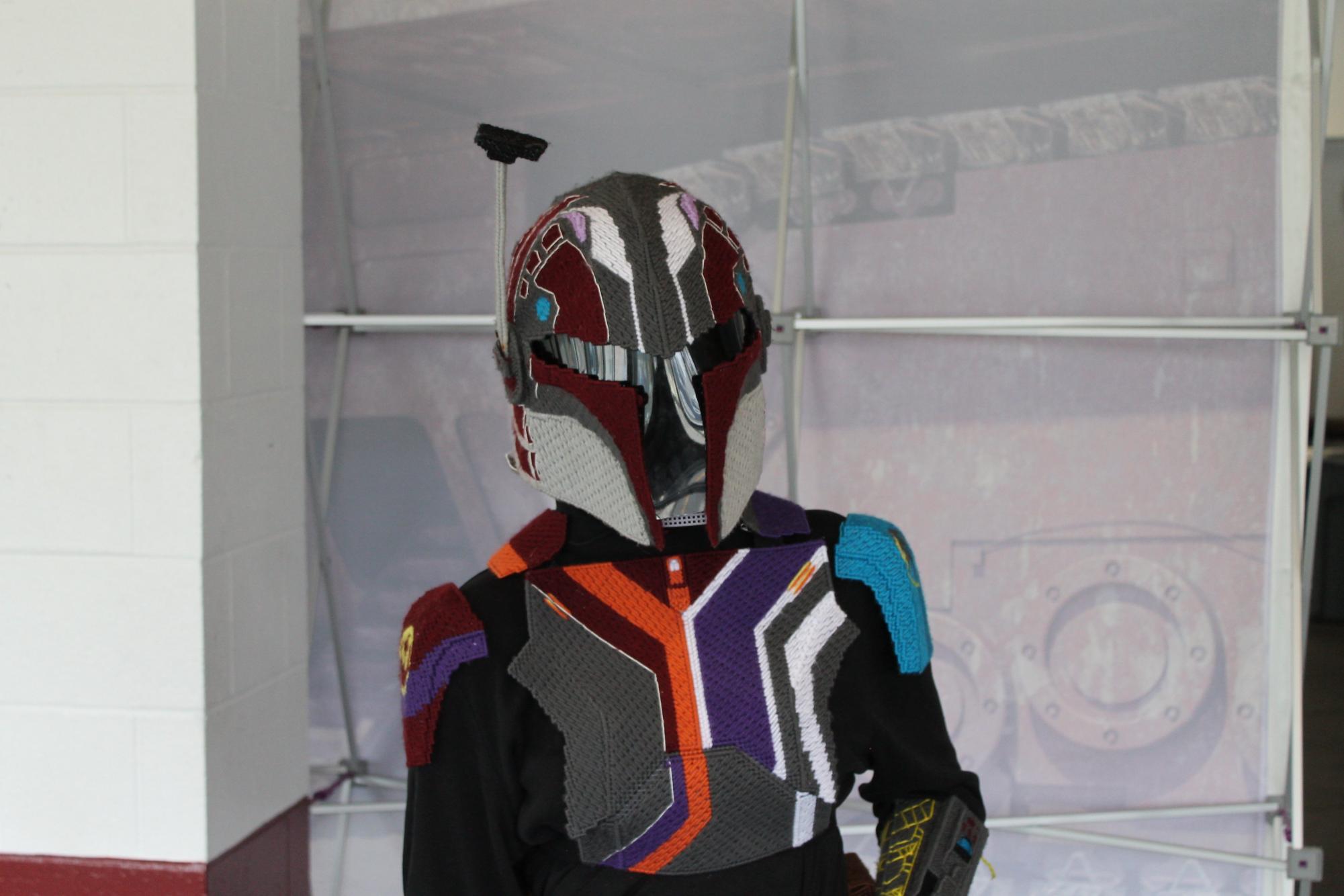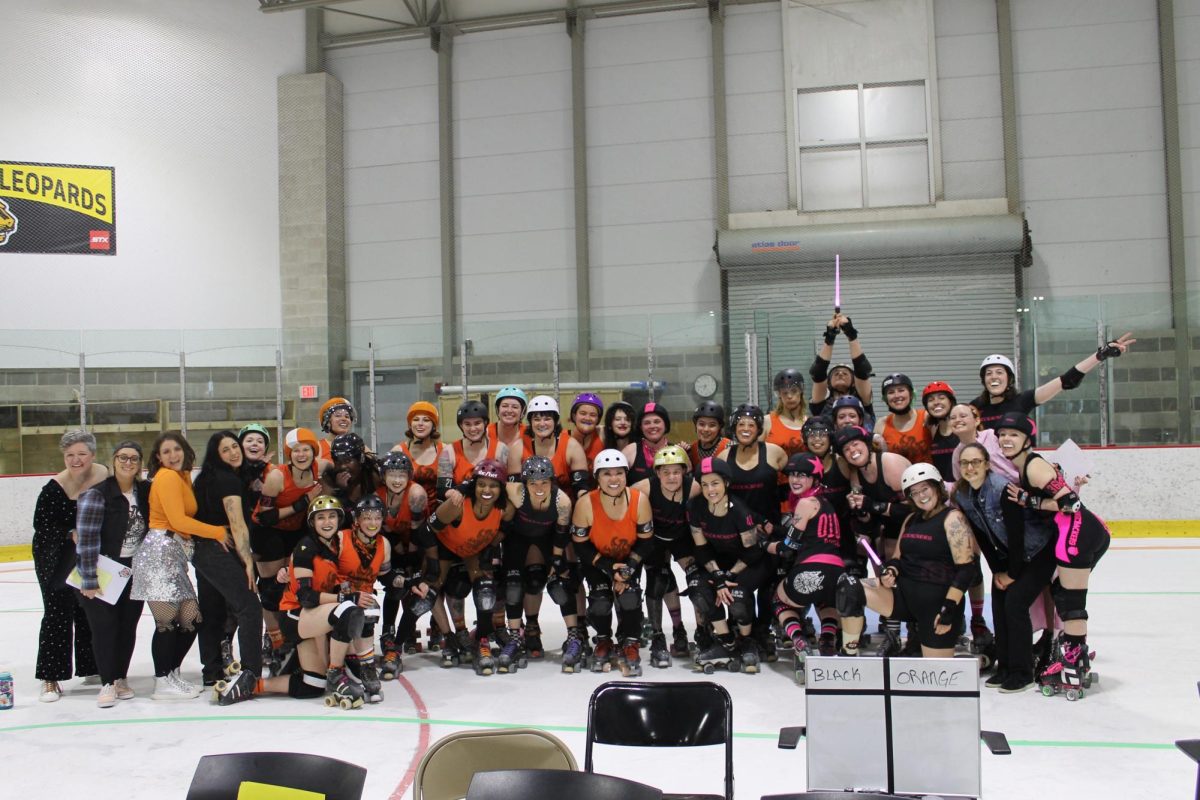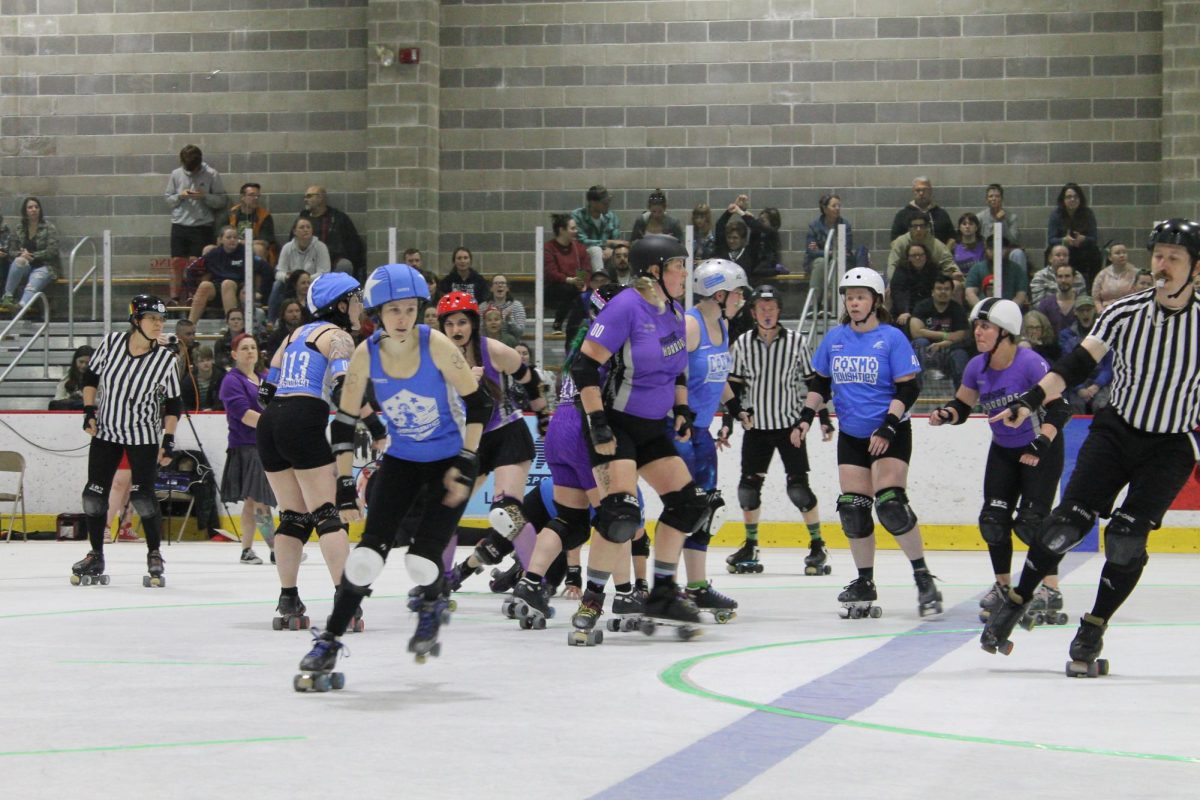Not so long ago, in a roller rink not so far away, Star Wars fans and members of the Boston Roller Derby joined forces for spirited competition. On May 4th, a day when Star Wars fans around the world proclaim “May the fourth be with you,” the Everett Allied Veterans Memorial Rink welcomed followers of the Force to two scheduled bouts and costume contests. Vendors and representatives from LGBTQ advocacy groups also attended, bringing together makers and community members of the area.
While Stormtroopers and Astromechs roamed about, athletes with bright hair, pun-tagged derby “boutfits”, and all the bravery of the Rebellion laced up their boots for their matchups.
Spectators surrounding and inside the rink waved lightsabers as skaters whizzed around the track. Vendors and advocates staffed tables at the back of the track, sharing information and selling food, art, and other homemade goods.
“We come to this event every year,” said Tony Leone, program director of the North Shore Alliance of GLBTQ Youth, or NAGLY. “For us, it’s about visibility and sharing our impact and what we do to support LGBTQIA+ youth across the Greater North Shore. For some of the other vendors here, it’s about marketing along with visibility.”
Members of the 501st New England Garrison, The Rebel Legion, the Mandalorian Protectors and the New England Droid Builders showed up in full force and fully costumed to greet attendees.
“If they’re already fans of Star Wars, it’s like they’re just seeing their heroes, which is amazing,” said Kevin Foye, the public relations officer for the 501st. “Or if you have kids who aren’t familiar with Star Wars, but recognize that this is something special, they may blow their mind temporarily and that’s really exciting to see — we’re all kind of kids at heart. We can still think of our first experience with Star Wars and how amazing that was.”
Several dedicated fans also came dressed to impress for the costume contests. “I think roller derby is really cool. I read about it in a book and I was looking for Star Wars night celebrations, and this happened to be a perfect blend of two things I’m really interested in,” said Rachel Myers, who was dressed in a handmade plastic-and-yarn Sabine Wren costume for the youth contest.

Originally a niche women’s sport, roller derby originally had a more theatrical style with choreographed performances and hits, but has now evolved into a sanctioned sport with rules and leagues spanning multiple continents.
Roller derby has also become a welcoming, gender-inclusive community for athletes of all skill levels.
“Back then, it was mostly choreographed and it’s very counterculture and I feel like the overlap between counterculture communities and queer communities is almost a circle,” said Lara Williams, who skates under the name Slaytrix and was appropriately named Jedi Mind Trix for the May 4 roller derby.
While diversity in many athletic leagues is a struggle, it isn’t just welcomed in roller derby — it’s celebrated.
“Something that’s really, really cool about this sport is that there is not only a place for everyone, but there are advantageous elements to every single body type — every single person who comes to this sport has a place,” Williams said. “It’s that diversity that makes a really strong team.”
In derby, there are blockers, who create blockades on the track by linking together; jammers, who try to break through and lap the blockers to score points; and pivots, who block for their team, give line directions, and can become the active jammer for their team. Both teams circle the track as their offense and defense simultaneously clash for points. Jammers wear helmet covers with stars on them and pivots wear helmets with stripes. Williams plays as a jammer for the Nutcrackers team and is playing her first season after a year and a half in the training program, working her way up from partial to full contact.
When it began in the 1930s, derby was played on a banked track, but flat track modification around 2001 has allowed more venues to host derby bouts. More bouts mean more opportunities to play, and more exposure to future fans, players and referees for roller derby.
In an intentional effort to address larger issues of discrimination against transgender athletes, Boston Roller Derby implemented mandatory trans inclusion in athletics courses at the end of 2022, as well as mediation through the Women’s Flat Track Derby Association, or WFTDA, to investigate and address safety concerns. The Boston Roller Derby league was one of the founding members of the WFTDA and has been running since it debuted in 2006.
“We’re a part of the Women’s Flat Track Derby Association, but the overall policy of Boston Roller Derby is to be gender expansive,” said Hailey Small, known under the derby name Chaos Theory. “If you think you belong here, you belong here.”
Small, who has been skating with the Boston Roller Derby since 2019 and is a blocker for the Nutcrackers, said that to her knowledge, this is the only competitive league of its type in the area.
“The energy here is really, really special — I am myself a trans woman and I have rarely if ever felt unwelcome here or like I didn’t belong,” said Anna Walcox, that day appearing under the derby name Anna-Soka Tano. Despite the intense nature of roller derby, the atmosphere was filled with camaraderie and friendship. “There’s just a league culture of meeting people where they are and we’re all just happy to be here and happy to see each other here.”
The Memorial Rink had transformed into a spaceport where all were welcome and celebrated and the Force was indeed with everyone.
“I absolutely love Star Wars and I can’t vouch for roller derby enough — it’s pretty much the best day of my life,” Williams said.









![A demonstrator hoists a sign above their head that reads, "We [heart] our international students." Among the posters were some listing international scientists, while other protesters held American flags.](https://huntnewsnu.com/wp-content/uploads/2025/06/image12-1200x800.jpg)


